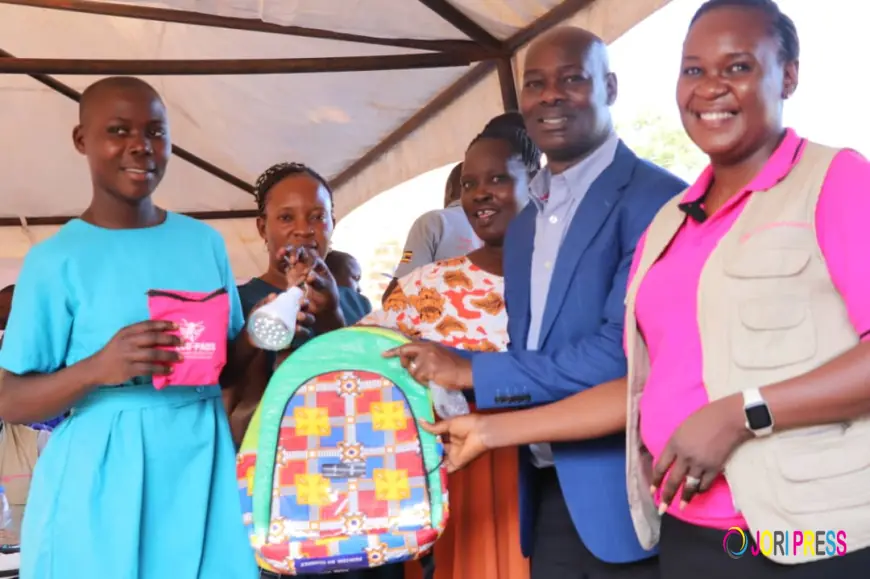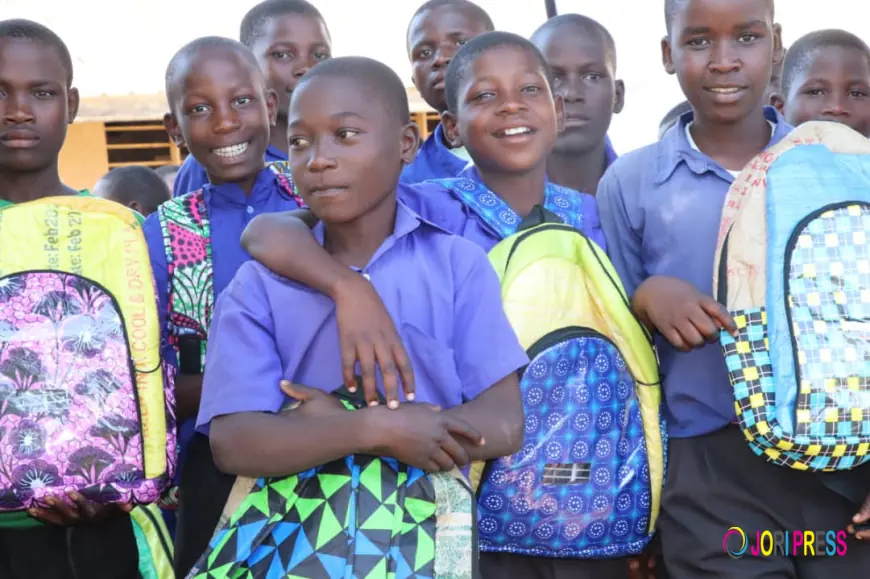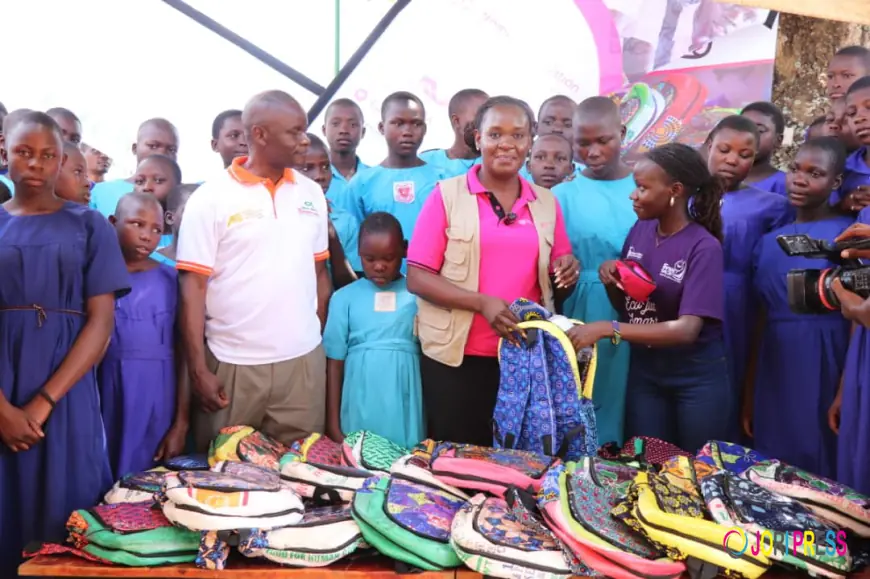STROMME FOUNDATION LAUNCHES INNOVATIVE ECOJUA BAG KITS TO COMBAT SCHOOL DROPOUTS IN LUUKA DISTRICT

Luuka District:
Through the ECOJUA initiative, Stromme Foundation has provided school girls with solar powered bags aimed at promoting school retention and completion by the girl child in Luuka district.
The handover ceremony held on 5th November 2025 at Namakakale Primary School and Walibo Primary School in Luuka District, eastern Uganda.
This initiative, according to Stromme foundation is aimed at empowering girls and keeping children in school amid the challenges of local sugarcane growing, highlights a collaborative effort to tackle period poverty, teenage pregnancy and forced child marriage and other educational barriers in rural Uganda.
During the project implementation, girls will be equipped with life skills to enable them make informed choices.
The ECOJUA bags made by The Smart Girls Foundation in partnership with funding from Stromme Foundation features waterproof backpacks containing reusable sanitary pads, integrated solar lights for nighttime studying, and educational booklets on menstrual health.
Distributed through school-based Bonga clubs, these bags are designed to address the critical reasons why many girls abandon their education: lack of access to hygiene products and safe study environments at home.
The launch event, attracted local government officials, educators, parents, and over 500 learners , underscored the transformative role of education in breaking the cycle of poverty. Stromme Foundation, a Norwegian-based nonprofit dedicated to fighting poverty through quality inclusive education, income generation and green job creation is promoting the Bonga clubs—after-school programs focused on life skills like self-confidence, decision-making, financial education, across Luuka District and other parts of Uganda. These clubs, implemented in collaboration with African Evangelistic Enterprises (AEE), Stromme foundation's regional partners in the Busoga sub-region, equip students with life skills like informed decision-making, self confidence, understanding adolescence as well as practical skills like making reusable sanitary pads and liquid soap to foster better menstrual health which is critical for retention of girls in school.

Bonga boys from WALIBO Primary school, LUUKA DISTRICT pose for a photo after receiving the bags
Joseph Walugembe, Programs Manager at Stromme Foundation, emphasized the urgency of such interventions in sugarcane growing areas like Luuka where teenage girls are likely to be lured into early sexual activity. "We recognize the government's Universal Primary Education (UPE) But additional effort is required to encourage learners, especially girls to stay in school which we do through extra-curricular activities of the Bonga in school clubs.’
Dinah Morgan, the Country Director for Stromme Foundation in Uganda, elaborated on the foundation's overarching mission. "The mission for Stromme Foundation is to fight poverty through quality inclusive education, income generation and job creation" Morgan explained. "We know what makes our girls drop out from school—mostly period-poverty, teenage pregnancy and forced early marriage which trap children in intergeneration poverty. That's why we have partnered with Smart Girls Foundation to launch the ECOJUA bags, made by the Bonga girls themselves. These include reusable sanitary pads, a light for reading after school, and a booklet to teach our girls how to overcome period poverty. We work hand-in-hand with AEE in Luuka District, the local government, School Management Committees (SMCs), and teachers to implement these changes."

Some of the leaners of Malibo Primary school and Namakakale primary school at the launch
At Namakakale Primary School, where enrollment has surged from 350 learners last year to 534 in primary and 132 in Early Childhood Development (ECD), the Headmaster Kajamiti Amos painted a vivid picture of progress and persistent hurdles. Over the past two years, partnerships with AEE and Stromme Foundation have yielded remarkable gains, transforming a school once plagued by infrastructure deficits and low retention rates.
"Last year, we enrolled over 350 learners, but now we have 534 in primary and 132 in ECD," Amos noted. "We were challenged with so many issues, including a lack of latrines, but in this period of two years, we have achieved a lot."
He highlighted key milestones: training the school management committee on crafting viable school improvement plans; training teachers in providing mental health and psychosocial support, equipping play and stimulation facilities; and supplying 360 learner-friendly chairs to replace uncomfortable adult-sized desks that were "hurting the younger children.
Additional supports included training in climate-smart agriculture where " learners are growing vegetable at school and even home—we provide seedlings to each child and do follow-ups, which can result in income-generating activities at home." The Bonga after-class sessions have been pivotal, Amos added, building self-confidence while teaching learners to make sanitary pads and liquid soap "mainly to improve sanitation." A new playground has also delighted the community, with Amos expressing deep gratitude: "I am grateful to AEE and Stromme Foundation."
The school stands out for its inclusive approach: "Here we empower children with disabilities, unlike other schools." Sensitization efforts with the education department have mobilized parents, reducing dropouts as "parents are now bringing learners to school."
Yet challenges remain. Amos called for better infrastructure, including adequate classrooms—ECD pupils currently study under tree shade—and more latrines to match the growing enrollment. He also stressed the need for community sensitization on ECD's value, as "part of the community don't believe in ECDs," and a fence to deter theft, grazing, and encroachers.
The head teacher of Walibo Primary School MS. Babilekele Rebecca reiterated the positive impact of Stromme foundation’s support programs for promoting retention and school completion by vulnerable girls who would otherwise lose their future to the excitement caused by little money offered by sugar cane plantation workers.
Mr. Dickens Ziwa a Board member of AEE, framed the initiative within the organization's dual mandate. "AEE has two approaches to create change: through the gospel and creating social change," he explained. Thanking the local community for its warm embrace, Dickens urged broader involvement: "I call upon everybody to be part of this, including the learners by staying in school." He hailed teachers as "heroes" for their dedication and issued a poignant plea to parents: "Urged parents not to throw bad comments at their children, maybe after having a family wrangle."
Local leaders echoed this enthusiasm. Hellen Aliwayatya, Community Development Officer (CDO) for Bulanga Town Council, praised the project's ripple effects. "As local government, we are very grateful to AEE and Stromme Foundation for this initiative because the bags will help our children at home for reading books," she said. "They have taught them so many activities—as CDO, you have lessened my work. We have sugarcane, but it's not useful because kids even hide in the plantations. I really thank Stromme Foundation and AEE."
Bulanga Town Council Deputy Mayor Namango Alice was equally effusive, linking the launch to wider community welfare. "She's very grateful to Stromme Foundation for the work it has done in the education sector," a council spokesperson relayed on her behalf. Alice implored residents: "She encourages the community to bring all children to school. Many girls are getting pregnant in the sugarcane, so sugarcane growing has done more harm."
Ijokua Mesely, Team Leader for ECOJUA Smart Bags at Smart Girls Foundation, oversaw the distribution and demonstrated the bags' features to eager students. "These aren't just bags—they're tools for staying and completing school, Mesely said, as girls learnt how to operate the solar lamps. "Waterproof design, pad slots for dignity during periods, and solar-powered lights mean no more studying by candlelight or dropping out because of the dark." She added that they have sofar distributed over 33,000 bags allover the country
As the sun set over the school grounds, with students clutching their new ECOJUA bags and chanting Bonga club slogans, the launch symbolized more than distribution—it represented determinaton by learenrs, especially girls to stay and complete school in Luuka's sugarcane fields. With government alignment and community buy-in, Stromme Foundation and its partners aim to scale these efforts, potentially reaching thousands more learners. For now, in Namakakale and Walibo, the message is clear: Education, illuminated by one bag at a time, is the path out of poverty.
What's Your Reaction?
 Like
0
Like
0
 Dislike
0
Dislike
0
 Love
0
Love
0
 Funny
0
Funny
0
 Angry
0
Angry
0
 Sad
0
Sad
0
 Wow
0
Wow
0

















































